HLT301 Assignment: Reflection on TED Talk on Drug Addiction
VerifiedAdded on 2022/09/01
|11
|3128
|15
Essay
AI Summary
This essay is a reflection on a TED Talk titled "Everything We Think We Know About Addiction Is Wrong" by Johann Hari, exploring the complexities of drug addiction and its treatment. The student uses the Gibbs reflective model to analyze the talk, discussing personal feelings, learning outcomes, and implications for future nursing practice. The essay summarizes Hari's arguments against the traditional "war on drugs" approach, highlighting the importance of social connection and compassion in addressing addiction. It also critiques the talk's limitations, particularly its lack of scientific rigor and biological considerations, while acknowledging the significance of the message for mental health care. The student emphasizes the importance of understanding addiction as a social disorder and the need for social programs and compassionate care in their future nursing practice.
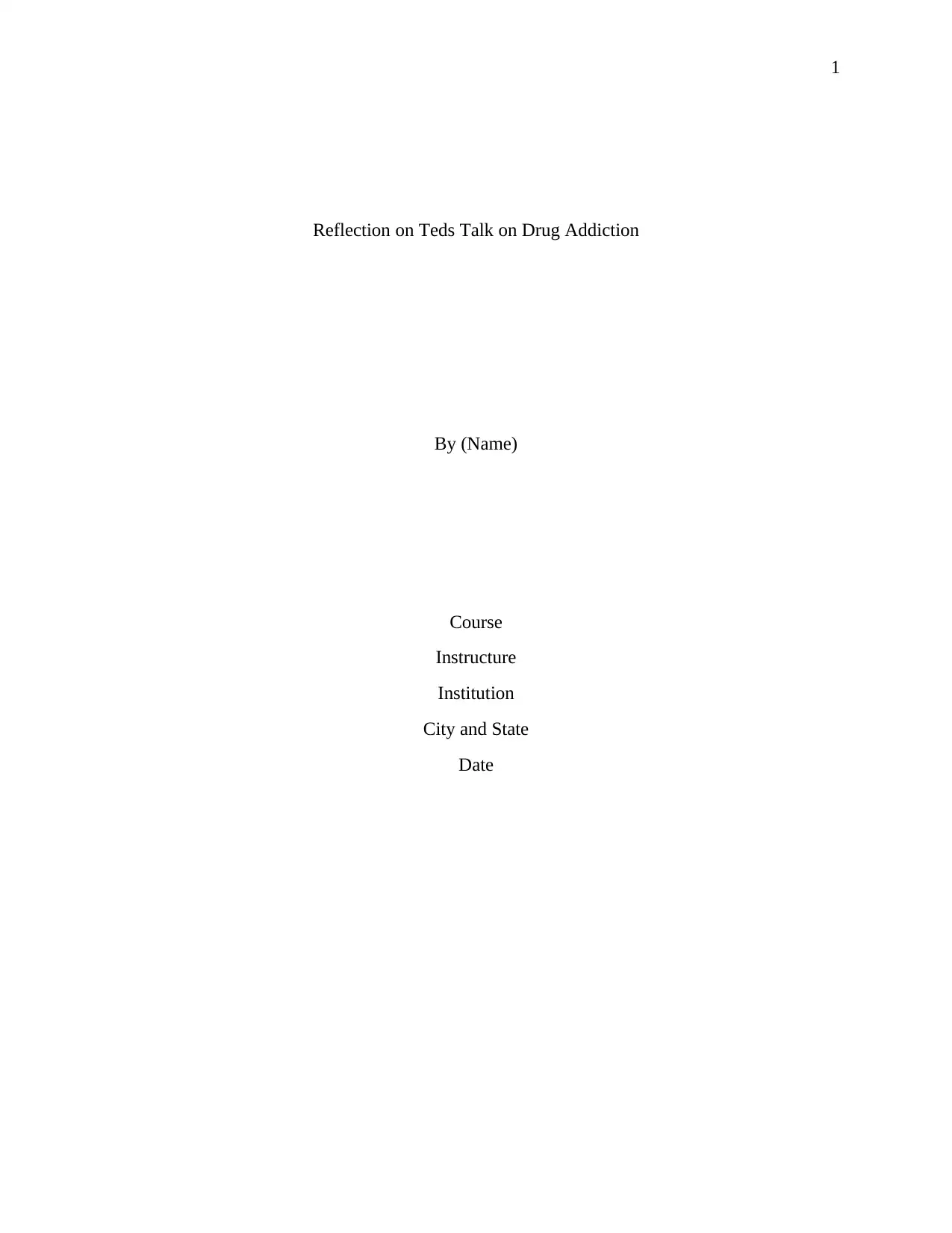
1
Reflection on Teds Talk on Drug Addiction
By (Name)
Course
Instructure
Institution
City and State
Date
Reflection on Teds Talk on Drug Addiction
By (Name)
Course
Instructure
Institution
City and State
Date
Paraphrase This Document
Need a fresh take? Get an instant paraphrase of this document with our AI Paraphraser
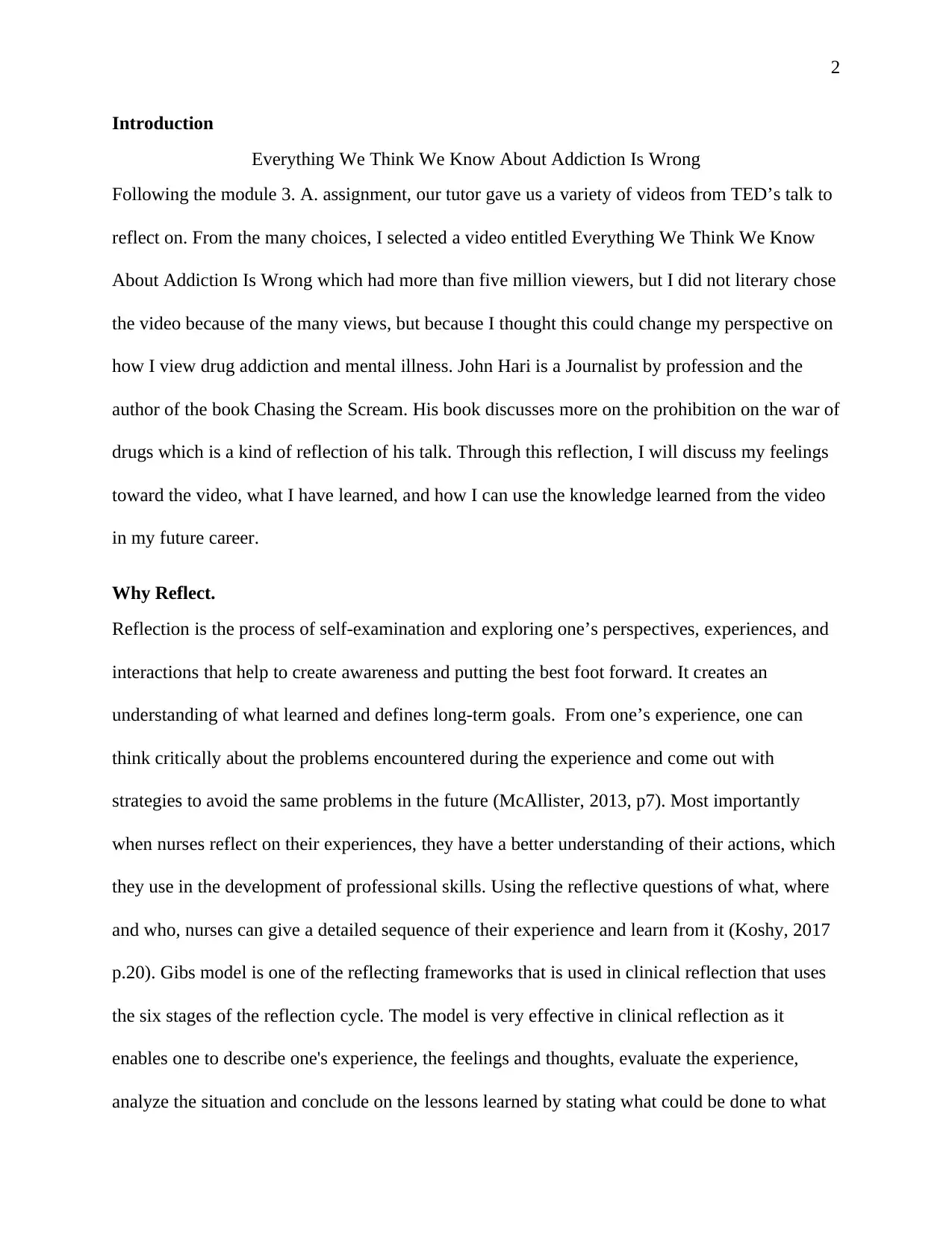
2
Introduction
Everything We Think We Know About Addiction Is Wrong
Following the module 3. A. assignment, our tutor gave us a variety of videos from TED’s talk to
reflect on. From the many choices, I selected a video entitled Everything We Think We Know
About Addiction Is Wrong which had more than five million viewers, but I did not literary chose
the video because of the many views, but because I thought this could change my perspective on
how I view drug addiction and mental illness. John Hari is a Journalist by profession and the
author of the book Chasing the Scream. His book discusses more on the prohibition on the war of
drugs which is a kind of reflection of his talk. Through this reflection, I will discuss my feelings
toward the video, what I have learned, and how I can use the knowledge learned from the video
in my future career.
Why Reflect.
Reflection is the process of self-examination and exploring one’s perspectives, experiences, and
interactions that help to create awareness and putting the best foot forward. It creates an
understanding of what learned and defines long-term goals. From one’s experience, one can
think critically about the problems encountered during the experience and come out with
strategies to avoid the same problems in the future (McAllister, 2013, p7). Most importantly
when nurses reflect on their experiences, they have a better understanding of their actions, which
they use in the development of professional skills. Using the reflective questions of what, where
and who, nurses can give a detailed sequence of their experience and learn from it (Koshy, 2017
p.20). Gibs model is one of the reflecting frameworks that is used in clinical reflection that uses
the six stages of the reflection cycle. The model is very effective in clinical reflection as it
enables one to describe one's experience, the feelings and thoughts, evaluate the experience,
analyze the situation and conclude on the lessons learned by stating what could be done to what
Introduction
Everything We Think We Know About Addiction Is Wrong
Following the module 3. A. assignment, our tutor gave us a variety of videos from TED’s talk to
reflect on. From the many choices, I selected a video entitled Everything We Think We Know
About Addiction Is Wrong which had more than five million viewers, but I did not literary chose
the video because of the many views, but because I thought this could change my perspective on
how I view drug addiction and mental illness. John Hari is a Journalist by profession and the
author of the book Chasing the Scream. His book discusses more on the prohibition on the war of
drugs which is a kind of reflection of his talk. Through this reflection, I will discuss my feelings
toward the video, what I have learned, and how I can use the knowledge learned from the video
in my future career.
Why Reflect.
Reflection is the process of self-examination and exploring one’s perspectives, experiences, and
interactions that help to create awareness and putting the best foot forward. It creates an
understanding of what learned and defines long-term goals. From one’s experience, one can
think critically about the problems encountered during the experience and come out with
strategies to avoid the same problems in the future (McAllister, 2013, p7). Most importantly
when nurses reflect on their experiences, they have a better understanding of their actions, which
they use in the development of professional skills. Using the reflective questions of what, where
and who, nurses can give a detailed sequence of their experience and learn from it (Koshy, 2017
p.20). Gibs model is one of the reflecting frameworks that is used in clinical reflection that uses
the six stages of the reflection cycle. The model is very effective in clinical reflection as it
enables one to describe one's experience, the feelings and thoughts, evaluate the experience,
analyze the situation and conclude on the lessons learned by stating what could be done to what
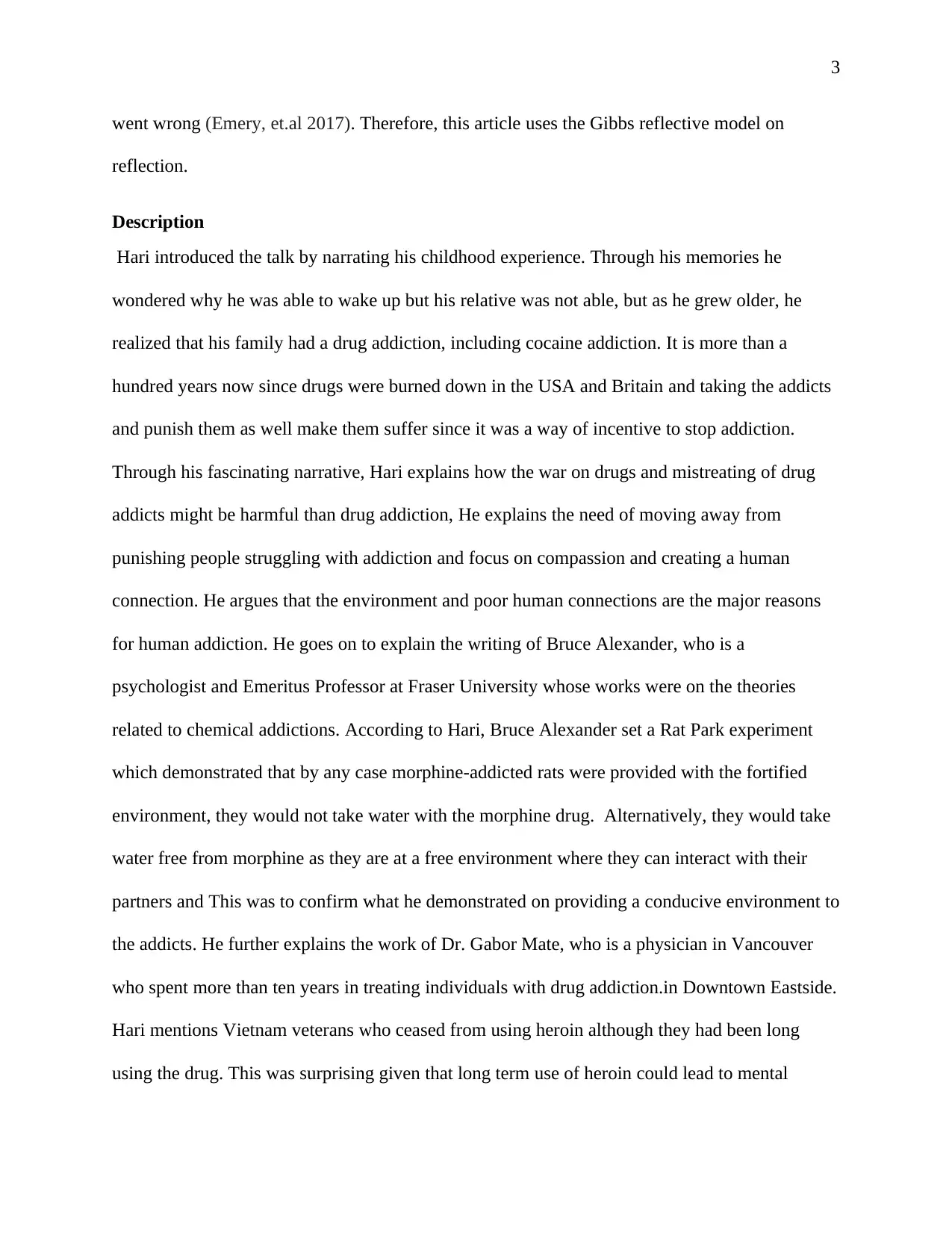
3
went wrong (Emery, et.al 2017). Therefore, this article uses the Gibbs reflective model on
reflection.
Description
Hari introduced the talk by narrating his childhood experience. Through his memories he
wondered why he was able to wake up but his relative was not able, but as he grew older, he
realized that his family had a drug addiction, including cocaine addiction. It is more than a
hundred years now since drugs were burned down in the USA and Britain and taking the addicts
and punish them as well make them suffer since it was a way of incentive to stop addiction.
Through his fascinating narrative, Hari explains how the war on drugs and mistreating of drug
addicts might be harmful than drug addiction, He explains the need of moving away from
punishing people struggling with addiction and focus on compassion and creating a human
connection. He argues that the environment and poor human connections are the major reasons
for human addiction. He goes on to explain the writing of Bruce Alexander, who is a
psychologist and Emeritus Professor at Fraser University whose works were on the theories
related to chemical addictions. According to Hari, Bruce Alexander set a Rat Park experiment
which demonstrated that by any case morphine-addicted rats were provided with the fortified
environment, they would not take water with the morphine drug. Alternatively, they would take
water free from morphine as they are at a free environment where they can interact with their
partners and This was to confirm what he demonstrated on providing a conducive environment to
the addicts. He further explains the work of Dr. Gabor Mate, who is a physician in Vancouver
who spent more than ten years in treating individuals with drug addiction.in Downtown Eastside.
Hari mentions Vietnam veterans who ceased from using heroin although they had been long
using the drug. This was surprising given that long term use of heroin could lead to mental
went wrong (Emery, et.al 2017). Therefore, this article uses the Gibbs reflective model on
reflection.
Description
Hari introduced the talk by narrating his childhood experience. Through his memories he
wondered why he was able to wake up but his relative was not able, but as he grew older, he
realized that his family had a drug addiction, including cocaine addiction. It is more than a
hundred years now since drugs were burned down in the USA and Britain and taking the addicts
and punish them as well make them suffer since it was a way of incentive to stop addiction.
Through his fascinating narrative, Hari explains how the war on drugs and mistreating of drug
addicts might be harmful than drug addiction, He explains the need of moving away from
punishing people struggling with addiction and focus on compassion and creating a human
connection. He argues that the environment and poor human connections are the major reasons
for human addiction. He goes on to explain the writing of Bruce Alexander, who is a
psychologist and Emeritus Professor at Fraser University whose works were on the theories
related to chemical addictions. According to Hari, Bruce Alexander set a Rat Park experiment
which demonstrated that by any case morphine-addicted rats were provided with the fortified
environment, they would not take water with the morphine drug. Alternatively, they would take
water free from morphine as they are at a free environment where they can interact with their
partners and This was to confirm what he demonstrated on providing a conducive environment to
the addicts. He further explains the work of Dr. Gabor Mate, who is a physician in Vancouver
who spent more than ten years in treating individuals with drug addiction.in Downtown Eastside.
Hari mentions Vietnam veterans who ceased from using heroin although they had been long
using the drug. This was surprising given that long term use of heroin could lead to mental
⊘ This is a preview!⊘
Do you want full access?
Subscribe today to unlock all pages.

Trusted by 1+ million students worldwide
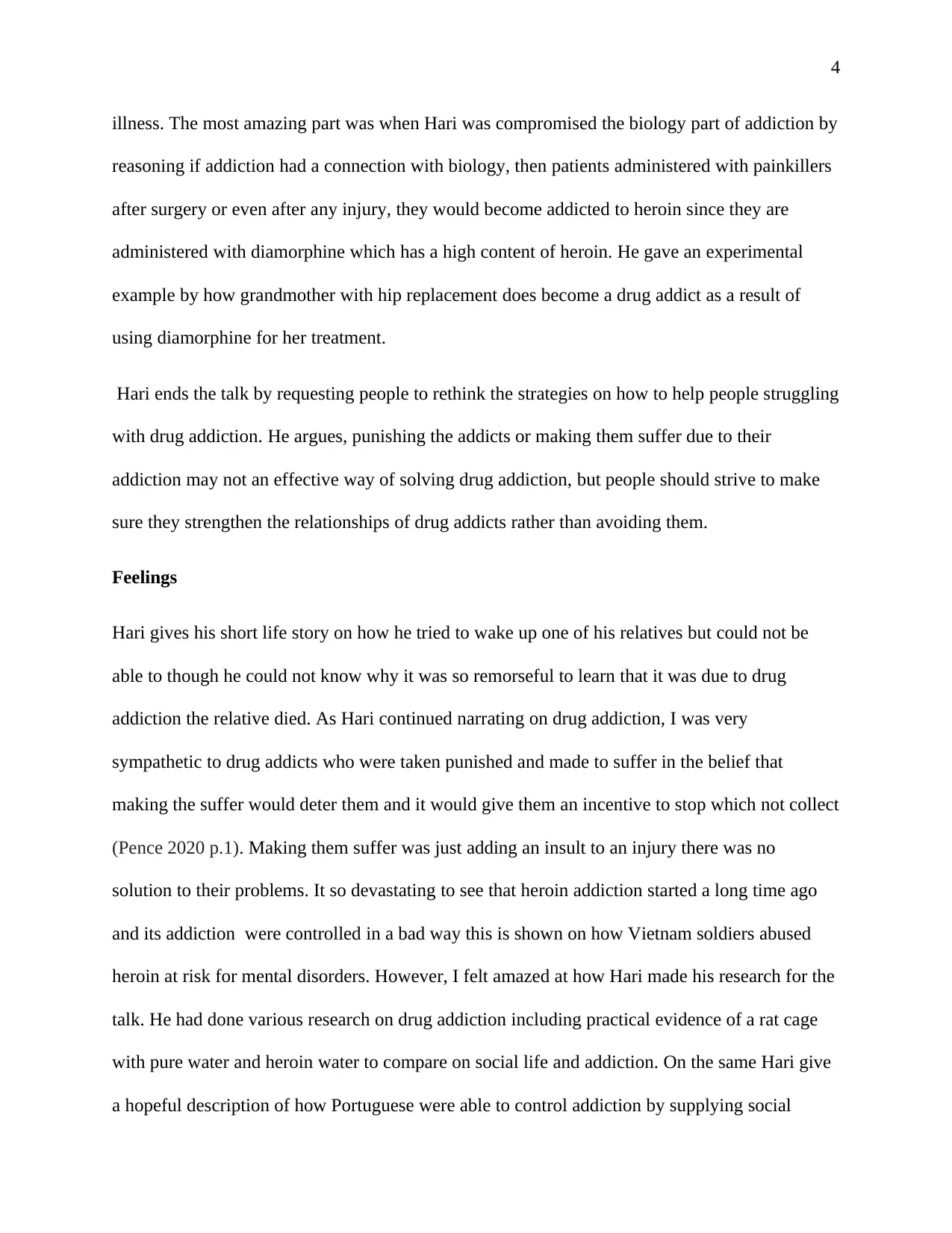
4
illness. The most amazing part was when Hari was compromised the biology part of addiction by
reasoning if addiction had a connection with biology, then patients administered with painkillers
after surgery or even after any injury, they would become addicted to heroin since they are
administered with diamorphine which has a high content of heroin. He gave an experimental
example by how grandmother with hip replacement does become a drug addict as a result of
using diamorphine for her treatment.
Hari ends the talk by requesting people to rethink the strategies on how to help people struggling
with drug addiction. He argues, punishing the addicts or making them suffer due to their
addiction may not an effective way of solving drug addiction, but people should strive to make
sure they strengthen the relationships of drug addicts rather than avoiding them.
Feelings
Hari gives his short life story on how he tried to wake up one of his relatives but could not be
able to though he could not know why it was so remorseful to learn that it was due to drug
addiction the relative died. As Hari continued narrating on drug addiction, I was very
sympathetic to drug addicts who were taken punished and made to suffer in the belief that
making the suffer would deter them and it would give them an incentive to stop which not collect
(Pence 2020 p.1). Making them suffer was just adding an insult to an injury there was no
solution to their problems. It so devastating to see that heroin addiction started a long time ago
and its addiction were controlled in a bad way this is shown on how Vietnam soldiers abused
heroin at risk for mental disorders. However, I felt amazed at how Hari made his research for the
talk. He had done various research on drug addiction including practical evidence of a rat cage
with pure water and heroin water to compare on social life and addiction. On the same Hari give
a hopeful description of how Portuguese were able to control addiction by supplying social
illness. The most amazing part was when Hari was compromised the biology part of addiction by
reasoning if addiction had a connection with biology, then patients administered with painkillers
after surgery or even after any injury, they would become addicted to heroin since they are
administered with diamorphine which has a high content of heroin. He gave an experimental
example by how grandmother with hip replacement does become a drug addict as a result of
using diamorphine for her treatment.
Hari ends the talk by requesting people to rethink the strategies on how to help people struggling
with drug addiction. He argues, punishing the addicts or making them suffer due to their
addiction may not an effective way of solving drug addiction, but people should strive to make
sure they strengthen the relationships of drug addicts rather than avoiding them.
Feelings
Hari gives his short life story on how he tried to wake up one of his relatives but could not be
able to though he could not know why it was so remorseful to learn that it was due to drug
addiction the relative died. As Hari continued narrating on drug addiction, I was very
sympathetic to drug addicts who were taken punished and made to suffer in the belief that
making the suffer would deter them and it would give them an incentive to stop which not collect
(Pence 2020 p.1). Making them suffer was just adding an insult to an injury there was no
solution to their problems. It so devastating to see that heroin addiction started a long time ago
and its addiction were controlled in a bad way this is shown on how Vietnam soldiers abused
heroin at risk for mental disorders. However, I felt amazed at how Hari made his research for the
talk. He had done various research on drug addiction including practical evidence of a rat cage
with pure water and heroin water to compare on social life and addiction. On the same Hari give
a hopeful description of how Portuguese were able to control addiction by supplying social
Paraphrase This Document
Need a fresh take? Get an instant paraphrase of this document with our AI Paraphraser
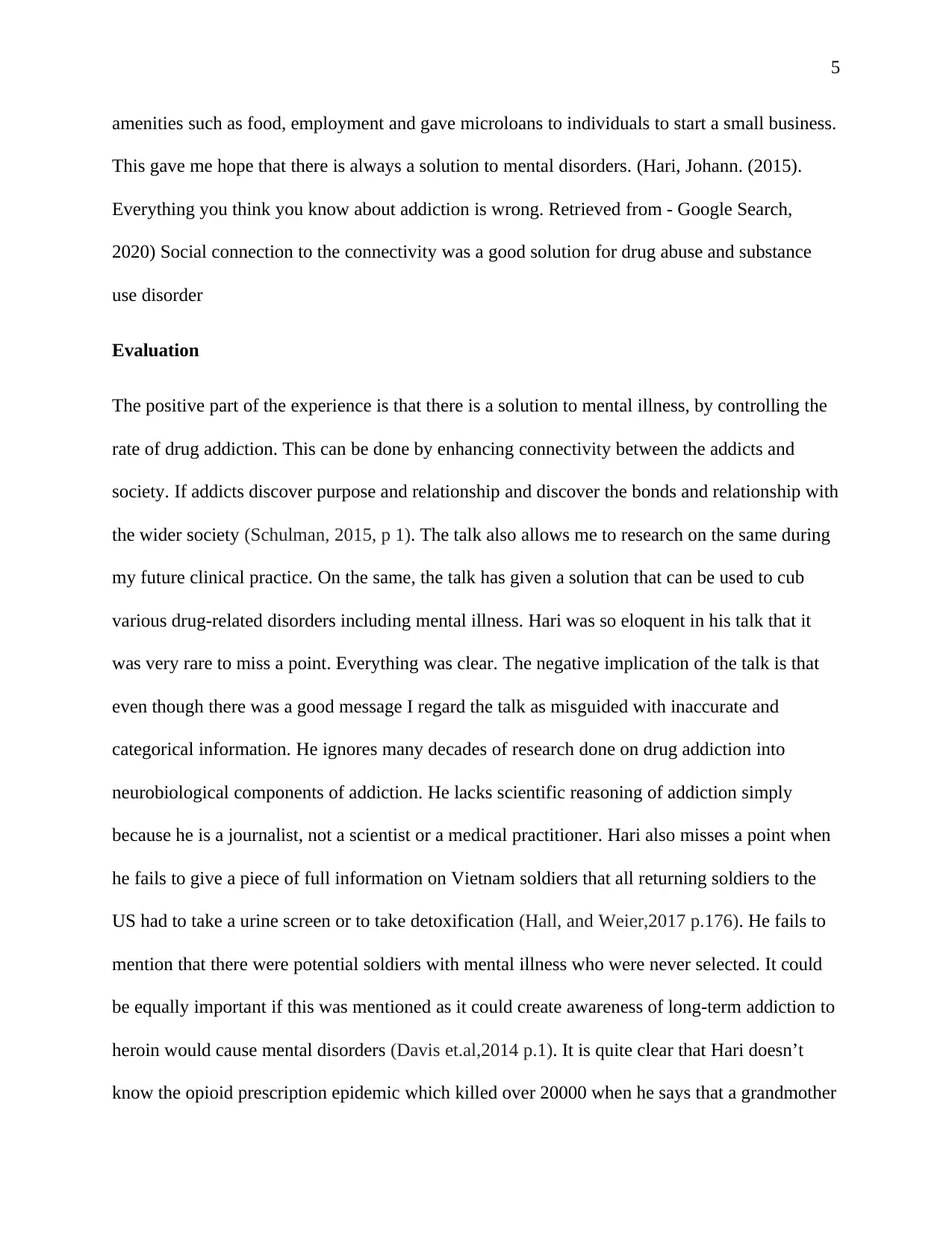
5
amenities such as food, employment and gave microloans to individuals to start a small business.
This gave me hope that there is always a solution to mental disorders. (Hari, Johann. (2015).
Everything you think you know about addiction is wrong. Retrieved from - Google Search,
2020) Social connection to the connectivity was a good solution for drug abuse and substance
use disorder
Evaluation
The positive part of the experience is that there is a solution to mental illness, by controlling the
rate of drug addiction. This can be done by enhancing connectivity between the addicts and
society. If addicts discover purpose and relationship and discover the bonds and relationship with
the wider society (Schulman, 2015, p 1). The talk also allows me to research on the same during
my future clinical practice. On the same, the talk has given a solution that can be used to cub
various drug-related disorders including mental illness. Hari was so eloquent in his talk that it
was very rare to miss a point. Everything was clear. The negative implication of the talk is that
even though there was a good message I regard the talk as misguided with inaccurate and
categorical information. He ignores many decades of research done on drug addiction into
neurobiological components of addiction. He lacks scientific reasoning of addiction simply
because he is a journalist, not a scientist or a medical practitioner. Hari also misses a point when
he fails to give a piece of full information on Vietnam soldiers that all returning soldiers to the
US had to take a urine screen or to take detoxification (Hall, and Weier,2017 p.176). He fails to
mention that there were potential soldiers with mental illness who were never selected. It could
be equally important if this was mentioned as it could create awareness of long-term addiction to
heroin would cause mental disorders (Davis et.al,2014 p.1). It is quite clear that Hari doesn’t
know the opioid prescription epidemic which killed over 20000 when he says that a grandmother
amenities such as food, employment and gave microloans to individuals to start a small business.
This gave me hope that there is always a solution to mental disorders. (Hari, Johann. (2015).
Everything you think you know about addiction is wrong. Retrieved from - Google Search,
2020) Social connection to the connectivity was a good solution for drug abuse and substance
use disorder
Evaluation
The positive part of the experience is that there is a solution to mental illness, by controlling the
rate of drug addiction. This can be done by enhancing connectivity between the addicts and
society. If addicts discover purpose and relationship and discover the bonds and relationship with
the wider society (Schulman, 2015, p 1). The talk also allows me to research on the same during
my future clinical practice. On the same, the talk has given a solution that can be used to cub
various drug-related disorders including mental illness. Hari was so eloquent in his talk that it
was very rare to miss a point. Everything was clear. The negative implication of the talk is that
even though there was a good message I regard the talk as misguided with inaccurate and
categorical information. He ignores many decades of research done on drug addiction into
neurobiological components of addiction. He lacks scientific reasoning of addiction simply
because he is a journalist, not a scientist or a medical practitioner. Hari also misses a point when
he fails to give a piece of full information on Vietnam soldiers that all returning soldiers to the
US had to take a urine screen or to take detoxification (Hall, and Weier,2017 p.176). He fails to
mention that there were potential soldiers with mental illness who were never selected. It could
be equally important if this was mentioned as it could create awareness of long-term addiction to
heroin would cause mental disorders (Davis et.al,2014 p.1). It is quite clear that Hari doesn’t
know the opioid prescription epidemic which killed over 20000 when he says that a grandmother
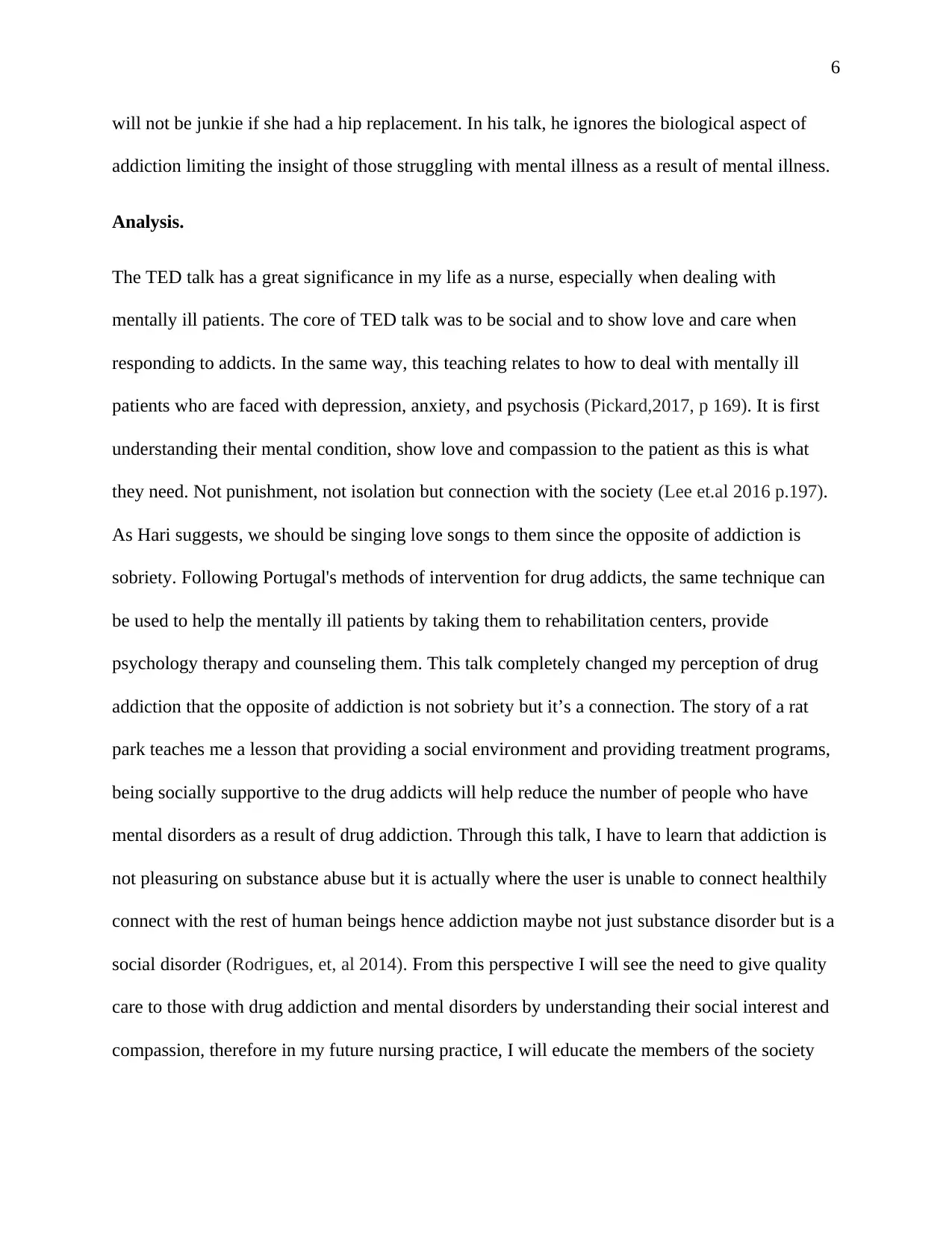
6
will not be junkie if she had a hip replacement. In his talk, he ignores the biological aspect of
addiction limiting the insight of those struggling with mental illness as a result of mental illness.
Analysis.
The TED talk has a great significance in my life as a nurse, especially when dealing with
mentally ill patients. The core of TED talk was to be social and to show love and care when
responding to addicts. In the same way, this teaching relates to how to deal with mentally ill
patients who are faced with depression, anxiety, and psychosis (Pickard,2017, p 169). It is first
understanding their mental condition, show love and compassion to the patient as this is what
they need. Not punishment, not isolation but connection with the society (Lee et.al 2016 p.197).
As Hari suggests, we should be singing love songs to them since the opposite of addiction is
sobriety. Following Portugal's methods of intervention for drug addicts, the same technique can
be used to help the mentally ill patients by taking them to rehabilitation centers, provide
psychology therapy and counseling them. This talk completely changed my perception of drug
addiction that the opposite of addiction is not sobriety but it’s a connection. The story of a rat
park teaches me a lesson that providing a social environment and providing treatment programs,
being socially supportive to the drug addicts will help reduce the number of people who have
mental disorders as a result of drug addiction. Through this talk, I have to learn that addiction is
not pleasuring on substance abuse but it is actually where the user is unable to connect healthily
connect with the rest of human beings hence addiction maybe not just substance disorder but is a
social disorder (Rodrigues, et, al 2014). From this perspective I will see the need to give quality
care to those with drug addiction and mental disorders by understanding their social interest and
compassion, therefore in my future nursing practice, I will educate the members of the society
will not be junkie if she had a hip replacement. In his talk, he ignores the biological aspect of
addiction limiting the insight of those struggling with mental illness as a result of mental illness.
Analysis.
The TED talk has a great significance in my life as a nurse, especially when dealing with
mentally ill patients. The core of TED talk was to be social and to show love and care when
responding to addicts. In the same way, this teaching relates to how to deal with mentally ill
patients who are faced with depression, anxiety, and psychosis (Pickard,2017, p 169). It is first
understanding their mental condition, show love and compassion to the patient as this is what
they need. Not punishment, not isolation but connection with the society (Lee et.al 2016 p.197).
As Hari suggests, we should be singing love songs to them since the opposite of addiction is
sobriety. Following Portugal's methods of intervention for drug addicts, the same technique can
be used to help the mentally ill patients by taking them to rehabilitation centers, provide
psychology therapy and counseling them. This talk completely changed my perception of drug
addiction that the opposite of addiction is not sobriety but it’s a connection. The story of a rat
park teaches me a lesson that providing a social environment and providing treatment programs,
being socially supportive to the drug addicts will help reduce the number of people who have
mental disorders as a result of drug addiction. Through this talk, I have to learn that addiction is
not pleasuring on substance abuse but it is actually where the user is unable to connect healthily
connect with the rest of human beings hence addiction maybe not just substance disorder but is a
social disorder (Rodrigues, et, al 2014). From this perspective I will see the need to give quality
care to those with drug addiction and mental disorders by understanding their social interest and
compassion, therefore in my future nursing practice, I will educate the members of the society
⊘ This is a preview!⊘
Do you want full access?
Subscribe today to unlock all pages.

Trusted by 1+ million students worldwide
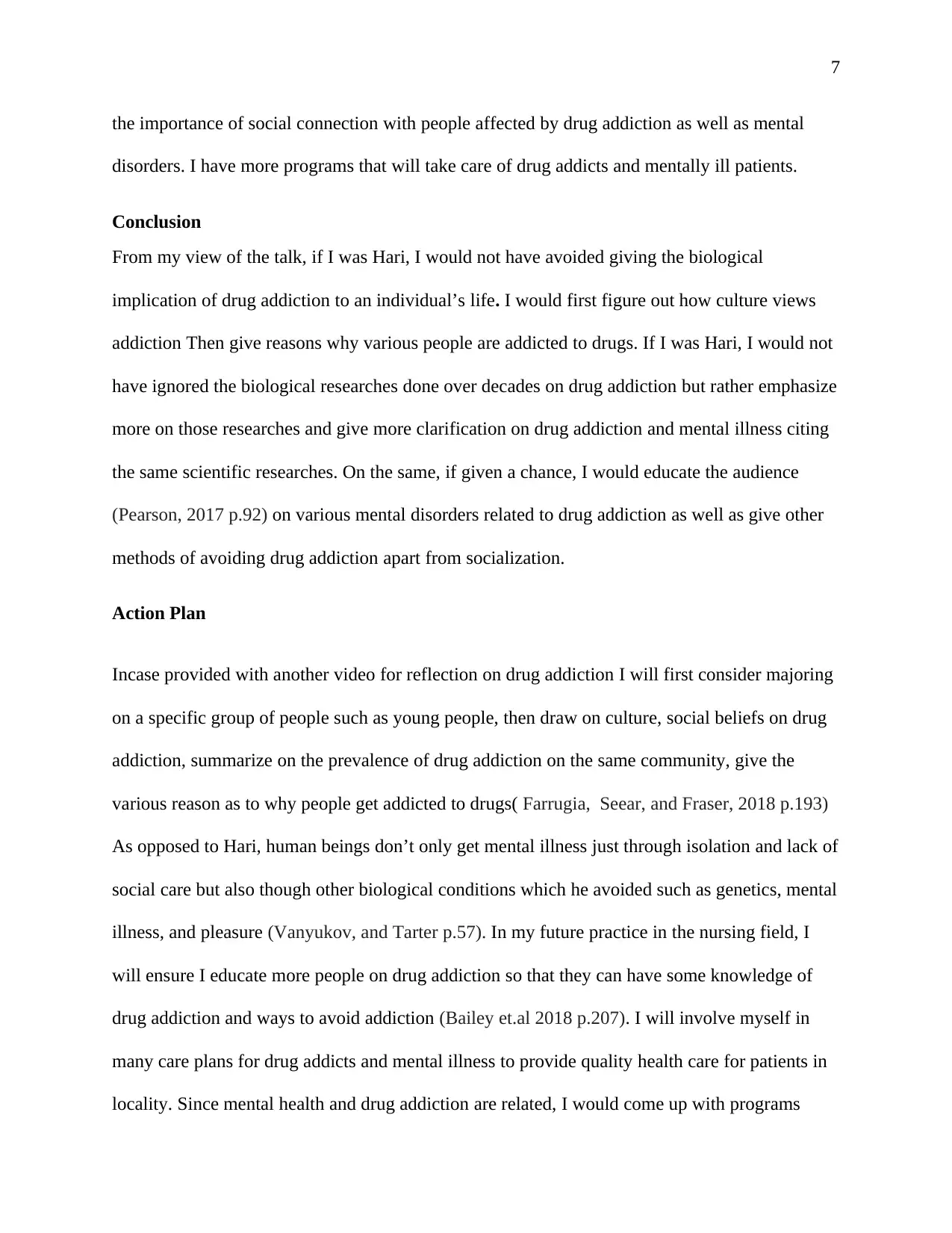
7
the importance of social connection with people affected by drug addiction as well as mental
disorders. I have more programs that will take care of drug addicts and mentally ill patients.
Conclusion
From my view of the talk, if I was Hari, I would not have avoided giving the biological
implication of drug addiction to an individual’s life. I would first figure out how culture views
addiction Then give reasons why various people are addicted to drugs. If I was Hari, I would not
have ignored the biological researches done over decades on drug addiction but rather emphasize
more on those researches and give more clarification on drug addiction and mental illness citing
the same scientific researches. On the same, if given a chance, I would educate the audience
(Pearson, 2017 p.92) on various mental disorders related to drug addiction as well as give other
methods of avoiding drug addiction apart from socialization.
Action Plan
Incase provided with another video for reflection on drug addiction I will first consider majoring
on a specific group of people such as young people, then draw on culture, social beliefs on drug
addiction, summarize on the prevalence of drug addiction on the same community, give the
various reason as to why people get addicted to drugs( Farrugia, Seear, and Fraser, 2018 p.193)
As opposed to Hari, human beings don’t only get mental illness just through isolation and lack of
social care but also though other biological conditions which he avoided such as genetics, mental
illness, and pleasure (Vanyukov, and Tarter p.57). In my future practice in the nursing field, I
will ensure I educate more people on drug addiction so that they can have some knowledge of
drug addiction and ways to avoid addiction (Bailey et.al 2018 p.207). I will involve myself in
many care plans for drug addicts and mental illness to provide quality health care for patients in
locality. Since mental health and drug addiction are related, I would come up with programs
the importance of social connection with people affected by drug addiction as well as mental
disorders. I have more programs that will take care of drug addicts and mentally ill patients.
Conclusion
From my view of the talk, if I was Hari, I would not have avoided giving the biological
implication of drug addiction to an individual’s life. I would first figure out how culture views
addiction Then give reasons why various people are addicted to drugs. If I was Hari, I would not
have ignored the biological researches done over decades on drug addiction but rather emphasize
more on those researches and give more clarification on drug addiction and mental illness citing
the same scientific researches. On the same, if given a chance, I would educate the audience
(Pearson, 2017 p.92) on various mental disorders related to drug addiction as well as give other
methods of avoiding drug addiction apart from socialization.
Action Plan
Incase provided with another video for reflection on drug addiction I will first consider majoring
on a specific group of people such as young people, then draw on culture, social beliefs on drug
addiction, summarize on the prevalence of drug addiction on the same community, give the
various reason as to why people get addicted to drugs( Farrugia, Seear, and Fraser, 2018 p.193)
As opposed to Hari, human beings don’t only get mental illness just through isolation and lack of
social care but also though other biological conditions which he avoided such as genetics, mental
illness, and pleasure (Vanyukov, and Tarter p.57). In my future practice in the nursing field, I
will ensure I educate more people on drug addiction so that they can have some knowledge of
drug addiction and ways to avoid addiction (Bailey et.al 2018 p.207). I will involve myself in
many care plans for drug addicts and mental illness to provide quality health care for patients in
locality. Since mental health and drug addiction are related, I would come up with programs
Paraphrase This Document
Need a fresh take? Get an instant paraphrase of this document with our AI Paraphraser
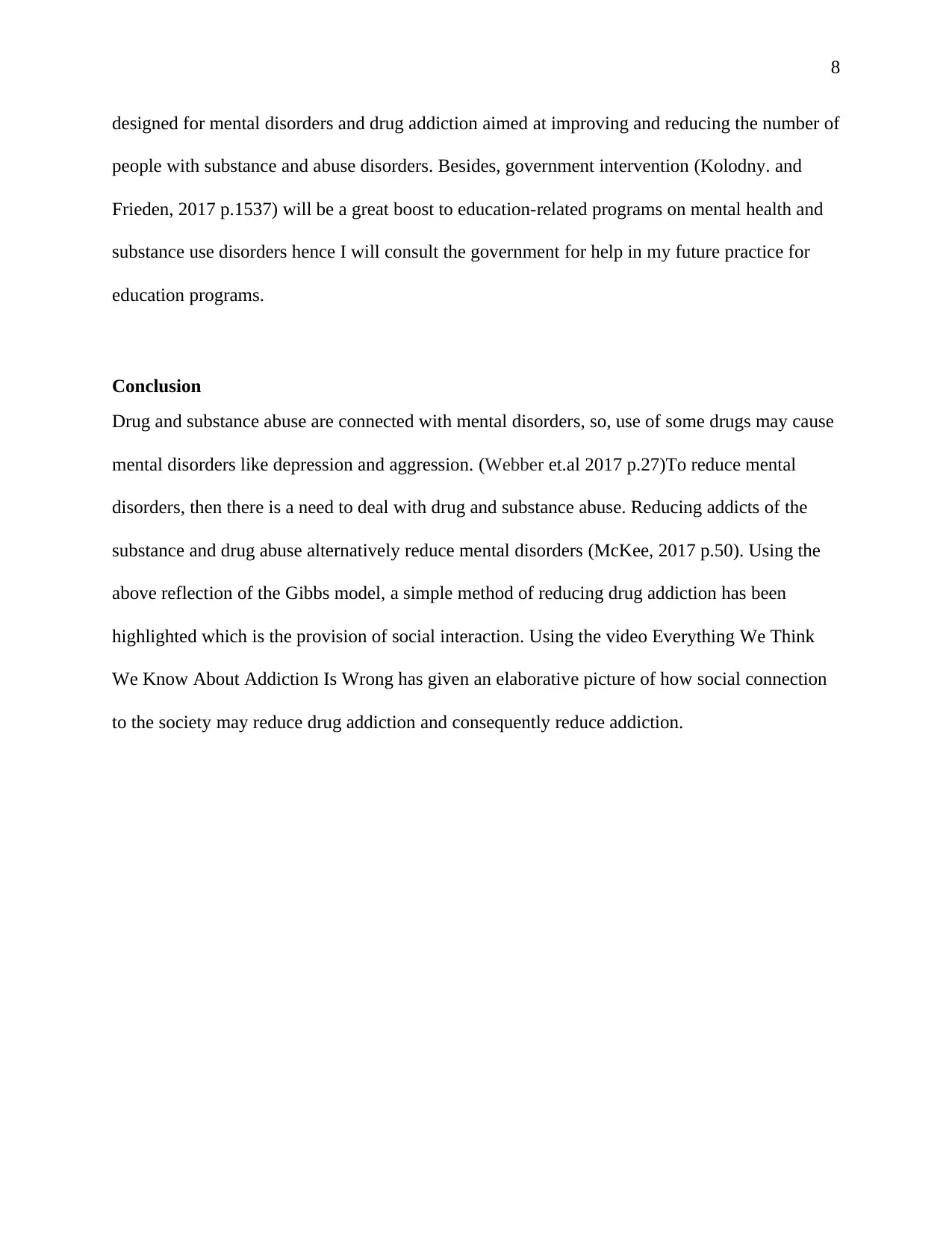
8
designed for mental disorders and drug addiction aimed at improving and reducing the number of
people with substance and abuse disorders. Besides, government intervention (Kolodny. and
Frieden, 2017 p.1537) will be a great boost to education-related programs on mental health and
substance use disorders hence I will consult the government for help in my future practice for
education programs.
Conclusion
Drug and substance abuse are connected with mental disorders, so, use of some drugs may cause
mental disorders like depression and aggression. (Webber et.al 2017 p.27)To reduce mental
disorders, then there is a need to deal with drug and substance abuse. Reducing addicts of the
substance and drug abuse alternatively reduce mental disorders (McKee, 2017 p.50). Using the
above reflection of the Gibbs model, a simple method of reducing drug addiction has been
highlighted which is the provision of social interaction. Using the video Everything We Think
We Know About Addiction Is Wrong has given an elaborative picture of how social connection
to the society may reduce drug addiction and consequently reduce addiction.
designed for mental disorders and drug addiction aimed at improving and reducing the number of
people with substance and abuse disorders. Besides, government intervention (Kolodny. and
Frieden, 2017 p.1537) will be a great boost to education-related programs on mental health and
substance use disorders hence I will consult the government for help in my future practice for
education programs.
Conclusion
Drug and substance abuse are connected with mental disorders, so, use of some drugs may cause
mental disorders like depression and aggression. (Webber et.al 2017 p.27)To reduce mental
disorders, then there is a need to deal with drug and substance abuse. Reducing addicts of the
substance and drug abuse alternatively reduce mental disorders (McKee, 2017 p.50). Using the
above reflection of the Gibbs model, a simple method of reducing drug addiction has been
highlighted which is the provision of social interaction. Using the video Everything We Think
We Know About Addiction Is Wrong has given an elaborative picture of how social connection
to the society may reduce drug addiction and consequently reduce addiction.
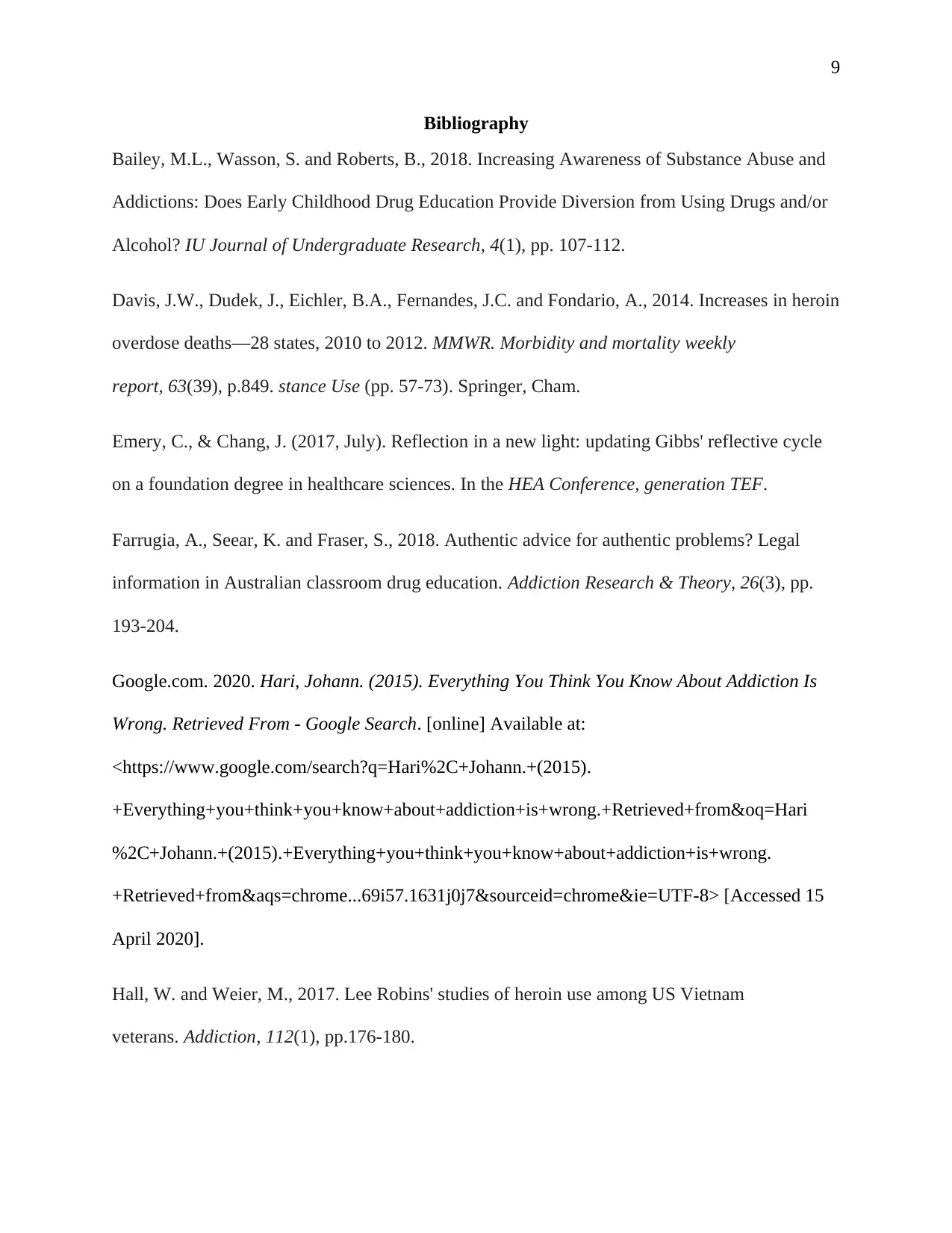
9
Bibliography
Bailey, M.L., Wasson, S. and Roberts, B., 2018. Increasing Awareness of Substance Abuse and
Addictions: Does Early Childhood Drug Education Provide Diversion from Using Drugs and/or
Alcohol? IU Journal of Undergraduate Research, 4(1), pp. 107-112.
Davis, J.W., Dudek, J., Eichler, B.A., Fernandes, J.C. and Fondario, A., 2014. Increases in heroin
overdose deaths—28 states, 2010 to 2012. MMWR. Morbidity and mortality weekly
report, 63(39), p.849. stance Use (pp. 57-73). Springer, Cham.
Emery, C., & Chang, J. (2017, July). Reflection in a new light: updating Gibbs' reflective cycle
on a foundation degree in healthcare sciences. In the HEA Conference, generation TEF.
Farrugia, A., Seear, K. and Fraser, S., 2018. Authentic advice for authentic problems? Legal
information in Australian classroom drug education. Addiction Research & Theory, 26(3), pp.
193-204.
Google.com. 2020. Hari, Johann. (2015). Everything You Think You Know About Addiction Is
Wrong. Retrieved From - Google Search. [online] Available at:
<https://www.google.com/search?q=Hari%2C+Johann.+(2015).
+Everything+you+think+you+know+about+addiction+is+wrong.+Retrieved+from&oq=Hari
%2C+Johann.+(2015).+Everything+you+think+you+know+about+addiction+is+wrong.
+Retrieved+from&aqs=chrome...69i57.1631j0j7&sourceid=chrome&ie=UTF-8> [Accessed 15
April 2020].
Hall, W. and Weier, M., 2017. Lee Robins' studies of heroin use among US Vietnam
veterans. Addiction, 112(1), pp.176-180.
Bibliography
Bailey, M.L., Wasson, S. and Roberts, B., 2018. Increasing Awareness of Substance Abuse and
Addictions: Does Early Childhood Drug Education Provide Diversion from Using Drugs and/or
Alcohol? IU Journal of Undergraduate Research, 4(1), pp. 107-112.
Davis, J.W., Dudek, J., Eichler, B.A., Fernandes, J.C. and Fondario, A., 2014. Increases in heroin
overdose deaths—28 states, 2010 to 2012. MMWR. Morbidity and mortality weekly
report, 63(39), p.849. stance Use (pp. 57-73). Springer, Cham.
Emery, C., & Chang, J. (2017, July). Reflection in a new light: updating Gibbs' reflective cycle
on a foundation degree in healthcare sciences. In the HEA Conference, generation TEF.
Farrugia, A., Seear, K. and Fraser, S., 2018. Authentic advice for authentic problems? Legal
information in Australian classroom drug education. Addiction Research & Theory, 26(3), pp.
193-204.
Google.com. 2020. Hari, Johann. (2015). Everything You Think You Know About Addiction Is
Wrong. Retrieved From - Google Search. [online] Available at:
<https://www.google.com/search?q=Hari%2C+Johann.+(2015).
+Everything+you+think+you+know+about+addiction+is+wrong.+Retrieved+from&oq=Hari
%2C+Johann.+(2015).+Everything+you+think+you+know+about+addiction+is+wrong.
+Retrieved+from&aqs=chrome...69i57.1631j0j7&sourceid=chrome&ie=UTF-8> [Accessed 15
April 2020].
Hall, W. and Weier, M., 2017. Lee Robins' studies of heroin use among US Vietnam
veterans. Addiction, 112(1), pp.176-180.
⊘ This is a preview!⊘
Do you want full access?
Subscribe today to unlock all pages.

Trusted by 1+ million students worldwide
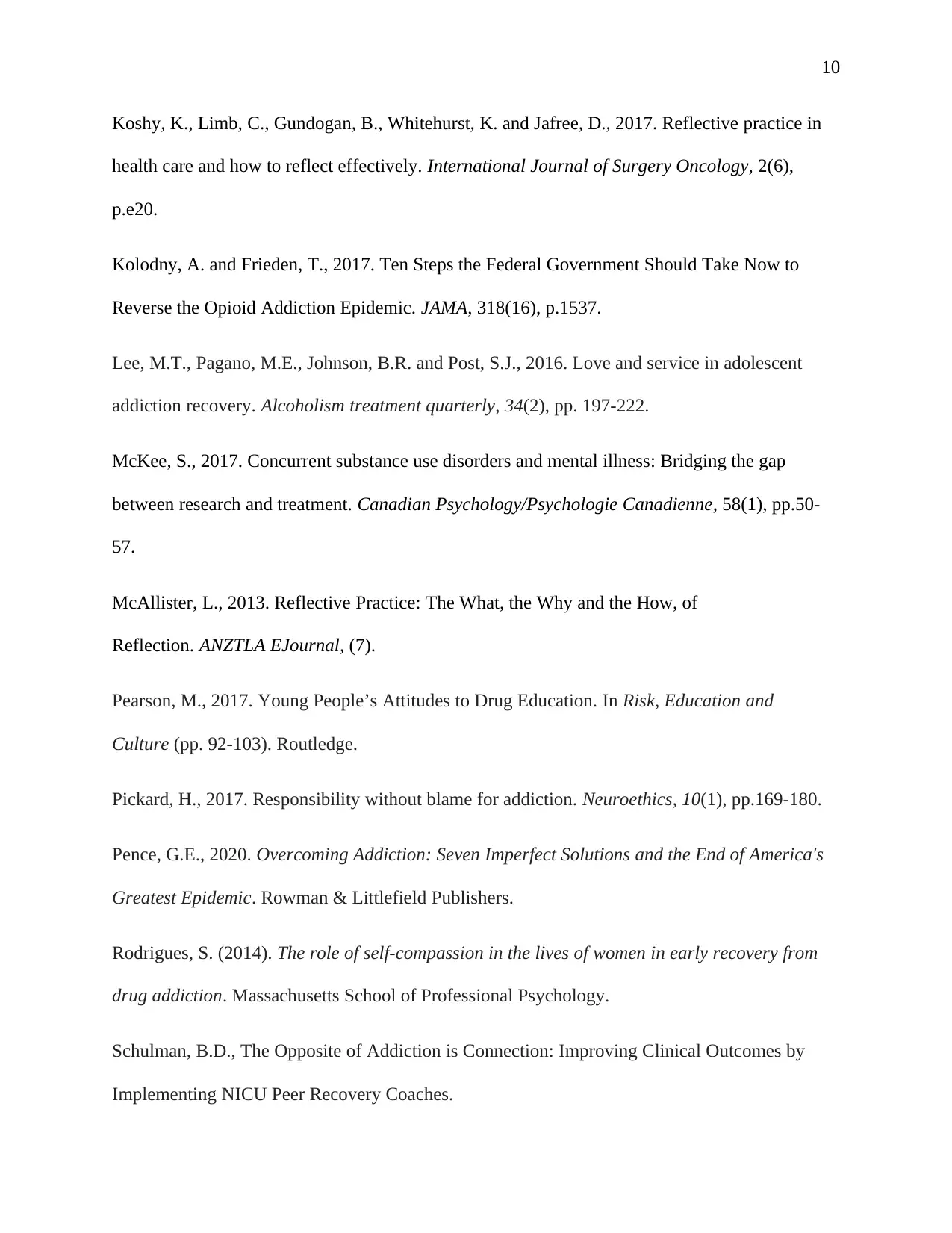
10
Koshy, K., Limb, C., Gundogan, B., Whitehurst, K. and Jafree, D., 2017. Reflective practice in
health care and how to reflect effectively. International Journal of Surgery Oncology, 2(6),
p.e20.
Kolodny, A. and Frieden, T., 2017. Ten Steps the Federal Government Should Take Now to
Reverse the Opioid Addiction Epidemic. JAMA, 318(16), p.1537.
Lee, M.T., Pagano, M.E., Johnson, B.R. and Post, S.J., 2016. Love and service in adolescent
addiction recovery. Alcoholism treatment quarterly, 34(2), pp. 197-222.
McKee, S., 2017. Concurrent substance use disorders and mental illness: Bridging the gap
between research and treatment. Canadian Psychology/Psychologie Canadienne, 58(1), pp.50-
57.
McAllister, L., 2013. Reflective Practice: The What, the Why and the How, of
Reflection. ANZTLA EJournal, (7).
Pearson, M., 2017. Young People’s Attitudes to Drug Education. In Risk, Education and
Culture (pp. 92-103). Routledge.
Pickard, H., 2017. Responsibility without blame for addiction. Neuroethics, 10(1), pp.169-180.
Pence, G.E., 2020. Overcoming Addiction: Seven Imperfect Solutions and the End of America's
Greatest Epidemic. Rowman & Littlefield Publishers.
Rodrigues, S. (2014). The role of self-compassion in the lives of women in early recovery from
drug addiction. Massachusetts School of Professional Psychology.
Schulman, B.D., The Opposite of Addiction is Connection: Improving Clinical Outcomes by
Implementing NICU Peer Recovery Coaches.
Koshy, K., Limb, C., Gundogan, B., Whitehurst, K. and Jafree, D., 2017. Reflective practice in
health care and how to reflect effectively. International Journal of Surgery Oncology, 2(6),
p.e20.
Kolodny, A. and Frieden, T., 2017. Ten Steps the Federal Government Should Take Now to
Reverse the Opioid Addiction Epidemic. JAMA, 318(16), p.1537.
Lee, M.T., Pagano, M.E., Johnson, B.R. and Post, S.J., 2016. Love and service in adolescent
addiction recovery. Alcoholism treatment quarterly, 34(2), pp. 197-222.
McKee, S., 2017. Concurrent substance use disorders and mental illness: Bridging the gap
between research and treatment. Canadian Psychology/Psychologie Canadienne, 58(1), pp.50-
57.
McAllister, L., 2013. Reflective Practice: The What, the Why and the How, of
Reflection. ANZTLA EJournal, (7).
Pearson, M., 2017. Young People’s Attitudes to Drug Education. In Risk, Education and
Culture (pp. 92-103). Routledge.
Pickard, H., 2017. Responsibility without blame for addiction. Neuroethics, 10(1), pp.169-180.
Pence, G.E., 2020. Overcoming Addiction: Seven Imperfect Solutions and the End of America's
Greatest Epidemic. Rowman & Littlefield Publishers.
Rodrigues, S. (2014). The role of self-compassion in the lives of women in early recovery from
drug addiction. Massachusetts School of Professional Psychology.
Schulman, B.D., The Opposite of Addiction is Connection: Improving Clinical Outcomes by
Implementing NICU Peer Recovery Coaches.
Paraphrase This Document
Need a fresh take? Get an instant paraphrase of this document with our AI Paraphraser
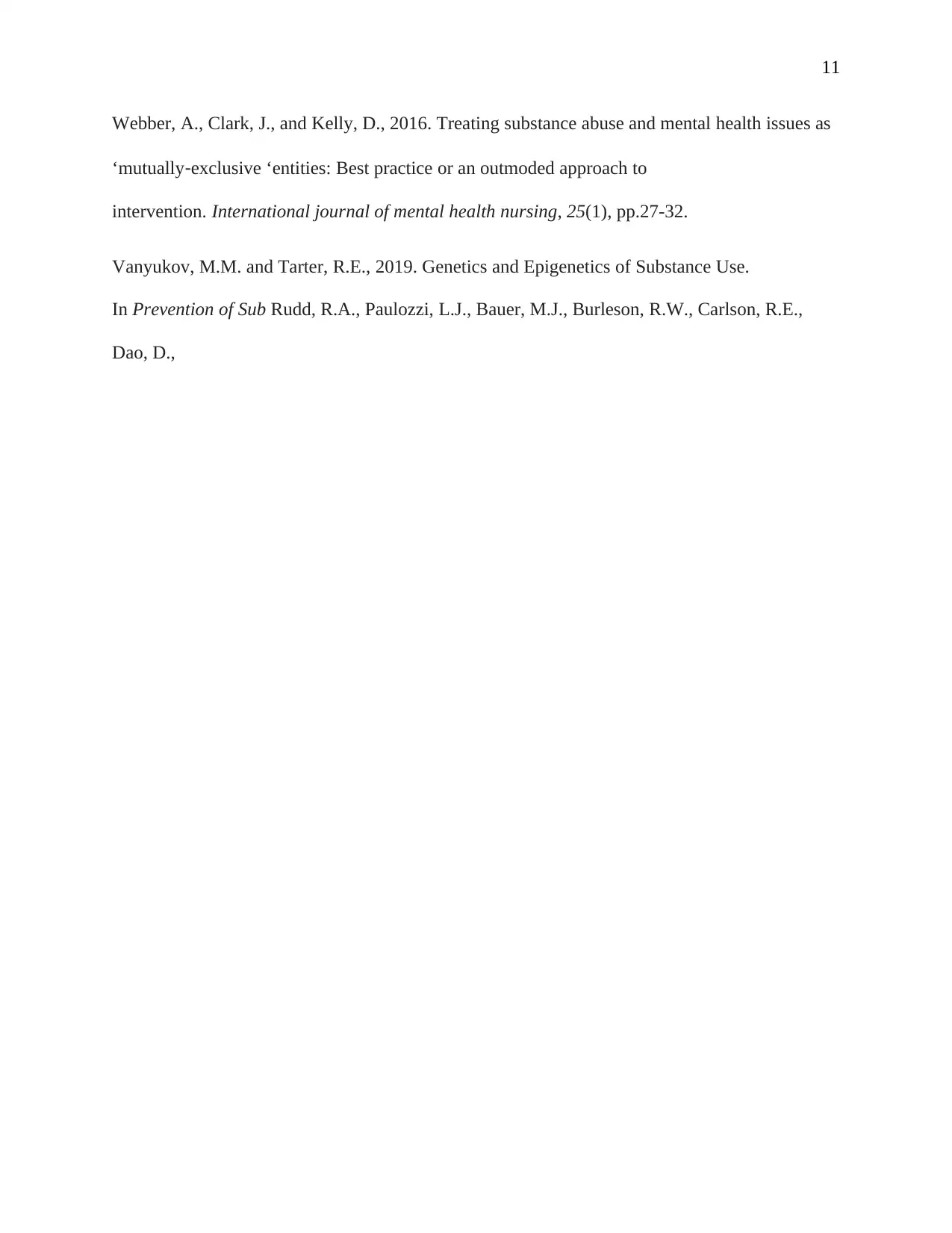
11
Webber, A., Clark, J., and Kelly, D., 2016. Treating substance abuse and mental health issues as
‘mutually‐exclusive ‘entities: Best practice or an outmoded approach to
intervention. International journal of mental health nursing, 25(1), pp.27-32.
Vanyukov, M.M. and Tarter, R.E., 2019. Genetics and Epigenetics of Substance Use.
In Prevention of Sub Rudd, R.A., Paulozzi, L.J., Bauer, M.J., Burleson, R.W., Carlson, R.E.,
Dao, D.,
Webber, A., Clark, J., and Kelly, D., 2016. Treating substance abuse and mental health issues as
‘mutually‐exclusive ‘entities: Best practice or an outmoded approach to
intervention. International journal of mental health nursing, 25(1), pp.27-32.
Vanyukov, M.M. and Tarter, R.E., 2019. Genetics and Epigenetics of Substance Use.
In Prevention of Sub Rudd, R.A., Paulozzi, L.J., Bauer, M.J., Burleson, R.W., Carlson, R.E.,
Dao, D.,
1 out of 11
Related Documents
Your All-in-One AI-Powered Toolkit for Academic Success.
+13062052269
info@desklib.com
Available 24*7 on WhatsApp / Email
![[object Object]](/_next/static/media/star-bottom.7253800d.svg)
Unlock your academic potential
Copyright © 2020–2025 A2Z Services. All Rights Reserved. Developed and managed by ZUCOL.





